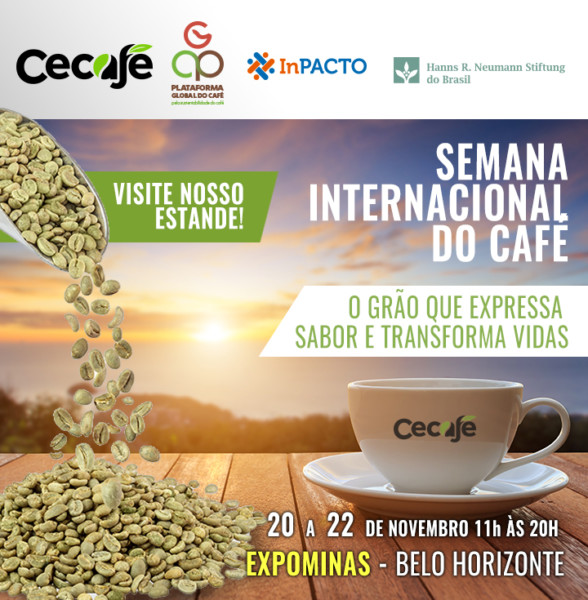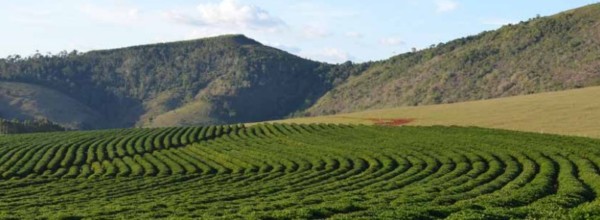The International Coffee Week (ICW) is once again consolidated as one of the most important events at national and global levels.
The event will be held from November 20 to 22, 2019, at Expominas, in Belo Horizonte, Minas Gerais. This year’s program features a myriad of simultaneous events, meetings, seminars, courses, contests and cupping sessions, divided into three main themes: Market & Consumption, Knowledge & Innovation, and Business & Entrepreneurship. For three days, coffee growers, roasters, exporters, classifiers, suppliers, baristas, specialists, coffee shop owners, industry communicators and connoisseurs, as well as coffee lovers and the general public will get to know what is new in the market in the sector’s largest Brazilian trade show, and will be able to choose the best Brazilian coffee of this season, at Brazil’s Coffee of the Year contest.
Held since 2013 in Belo Horizonte—capital of Brazil’s largest producing state—the ICW focuses on developing the Brazilian market and promoting the quality of national coffees to domestic consumers and buyer countries, in addition to improving the sector´s economic and social outcomes.
As mentioned above, the highlight this year will be the number of events and platforms being held simultaneously to the ICW, including: a Products and Brands Exhibition, the Coffee DNA 2019 (a symposium with national and international coffee chain players to discuss trends, challenges and actions for the future of the world coffee market); the Sustainable Coffee Growing Forum 2019; the National Barista Championships—which will host three competitions: the Brazilian Barista Championship (espressos, milk-based drinks and coffee drinks), the Brazilian Brewers Championship (Coffee Preparation) and the Brazilian Cup Tasters Championship (Coffee Tasting); the 9th IWCA Brazil’s National Meeting; the Model Coffee Making; the Roast Experience; the Producers’ Patio; the Café + Forte Producers Meeting; the Educampo Coffee Meetings; the Cupping & Business Rooms; and Brazil’s Coffee of the Year 2019.
As in the previous edition, Cecafé—as a legitimate advocate for the interests of the export sector—will be present with its institutional booth, aiming to take active part in relevant national and global discussions on sustainability and, consequently, to expand and promote its projects and programs, strengthening ties with stakeholders in the coffee sector.
In this sense, reaffirming its important partnerships with the export trade, research and education institutions, public and private companies, NGOs and associations, Cecafé takes a leading role in this multi-stakeholder booth. Cecafé’s leading actions are shared with the InPACTO institute (National Pact Institute for the Eradication of Slave Labor), the Neumann Foundation, and the Global Coffee Platform, with the support of Cooxupé.
Each strategic partner has different actions: InPACTO’s mission is to eradicate slave-like labor in Brazil’s various economic sectors. The Neumann Foundation, in turn, has its roots in coffee agribusiness, promoting sustainable development through the empowerment of producers and their families. The GCP has various activities in Brazil and worldwide, focusing on sustainability in coffee growing, and Cooxupé employs sustainability in its operations.
In the ICW 2019, Cecafé will promote an institutional action, involving members, strategic partners of the Public and Private sector, to value the coffee export sector’s Code of Ethics and Conduct and the Sustainability Seal. Created in 2015, the Code of Ethics and Conduct is a landmark for compliance in the export sector through which Cecafé members seek to extend the precepts of ethics and commitment with the laws in effect in the country to their supply chains. In this sense, the Brazilian Coffee Sustainability Seal was also created to support the initiative and to strengthen, recognize and promote Brazilian sustainability.

The Seal reinforces the industry’s sustainability and commitment with global coffee market players, including roasters and consumers worldwide, as it is above any global certification system. It is noteworthy that Brazil already has the certification due to its social and environmental laws and consolidated economic results. Widespread use of this Seal by Cecafé members further promotes the sustainability and quality of Brazilian coffee, with sovereignty and independence from any certification, for the reasons presented in this article and scientifically proven.
In this sense, the Brazilian Coffee Sustainability Seal is a matter of transparency, legitimacy and, above all, national sovereignty. In the universe of about 300,000 producers, respect for the environment is notorious and easily identifiable, given the continued efforts to protect spring waters, adopt rational water management, and apply advanced agricultural techniques to achieve significant productivity per hectare planted, which is the highest among producer countries.
Cecafé, as a legitimate representative of the export sector and a partner of producers and industry, is keeping an eye on global trends and on the need to articulate all links in the production chain. Taking advantage of the opportunity of exposure and engagement promoted by its booth at the ICW, Cecafé would like to invite our export partners to sign its code of conduct to enable the use of the Sustainability Seal and thus legitimize this fruitful partnership.
The Sustainability Seal, supported by the Code of Ethics and Conduct and Social Responsibility and Sustainability actions, demonstrates the export sector commitment to further expand successful socio-environmental projects and continue to promote the image of Brazilian coffee agribusiness in the world, meeting end consumer demands and fostering coffee consumption
With active participation of its associates, Cecafé, keeping an eye on global trends and the need to articulate all links between the production chain and consumers, will move on towards its mission: following the right path, using communication and other suitable and right tools for an increasingly sustainable and socially responsible future.
Marcos Matos – CECAFÉ CEO
Lilian Vendrametto – CECAFÉ Sustainability Manager




Leave A Comment